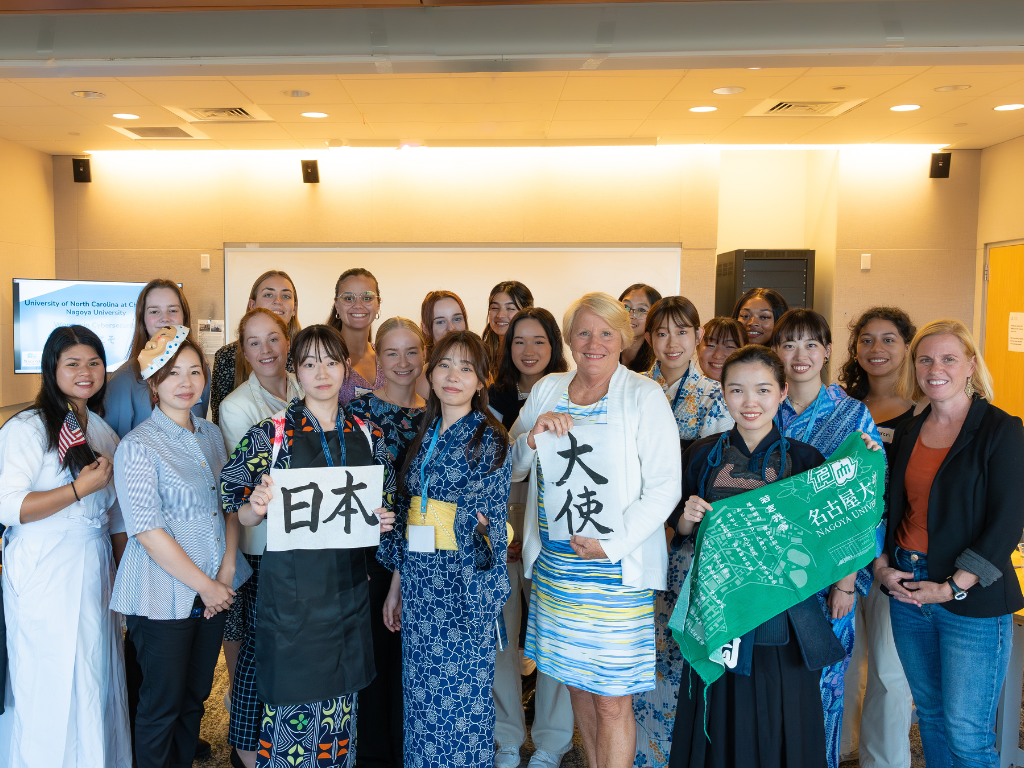Empowering Future US and Japanese Cybersecurity Leaders
October 12, 2023UNC Global Affairs
 Barbara Stephenson, Vice Provost for Global Affairs, smiles alongside Nagoya and Carolina students during the first part of the Women's Undergraduate Cybersecurity Engagement Program. (Photo By Walker Winslow).
Barbara Stephenson, Vice Provost for Global Affairs, smiles alongside Nagoya and Carolina students during the first part of the Women's Undergraduate Cybersecurity Engagement Program. (Photo By Walker Winslow).
Carolina and Nagoya University undergraduate women jointly explore education and careers in cybersecurity through U.S. Embassy Tokyo-funded exchange.
UNC-Chapel Hill and Nagoya University in Japan have joined forces to establish the Women’s Undergraduate Cybersecurity Engagement Program, organized by the Office of the Vice Provost for Global Affairs and funded by the U.S. Embassy Tokyo Public Affairs Section. This innovative exchange helps women from both institutions connect to pursue their shared interest in cybersecurity.
Seven female students from Nagoya University traveled to Chapel Hill in September for interactive workshops led by Carolina faculty, a site visit with the North Carolina Cybersecurity Task Force, and cultural exchange with UNC students.
“The Women’s Undergraduate Cybersecurity Engagement Program is a wonderful and practical opportunity for the female students from both universities to learn, experience and discuss Cybersecurity with global peers,” said Tomohisa Koyama, co-organizer of the visit and executive director of NU Tech.
In December, seven Carolina female students will visit Nagoya to explore technical aspects of cybersecurity, led by Erinn Whitaker, professor of the practice in UNC’s Curriculum in Peace, War and Defense, and Tim Rose, associate director for sponsored and exchange programs in the Office of the Vice Provost for Global Affairs, who together oversee the exchange program. Working in teams, students will engage in a cybersecurity simulation to defend against a hacking threat.
“Our goal was to create a program that not only has valuable learning opportunities, but also allows students to network, socialize and share experiences–because that’s how they build lasting relationships,” said Rose.
In 2022, the Office of the Vice Provost for Global Affairs launched exchange and sponsored programs with the goal of “bringing the world to Carolina” through expanded opportunities for international cultural and academic exchange on-campus—a goal that’s spelled out in the University’s Carolina Next: Innovations for Public Good strategic plan. In addition to the Women’s Undergraduate Cybersecurity Engagement Program, OVPGA has organized other exchange programs with Nagoya University in the areas of entrepreneurship and biomedical engineering. Grant funding through the U.S. State Department’s Bureau of Educational and Cultural Affairs will support additional exchanges this year bringing together indigenous youth from Ecuador and North Carolina and fostering women’s empowerment through the arts with women from Jordan and North Carolina.
Students from both UNC and Nagoya said they enjoyed learning together and getting to know one another.
“This exchange program has been an amazing opportunity for me to learn about the intersection of cybersecurity and international cooperation. I am grateful to the UNC faculty and students for welcoming us. It was very inspiring to meet and talk with other women pursuing national security and computer science,” said Mariko Yoshida, a senior at Nagoya University studying informatics.
According to Isabel Lucas, UNC sophomore and student program coordinator, this global learning and networking opportunity was created with female students in mind.
“The fact of the matter is most national security settings are men’s settings, right? And so, by deliberately creating an intentional space for women, we’re able to have conversations that we otherwise probably wouldn’t be able to have, and I think that’s really important,” said Lucas.
Lucas will join the UNC group visiting Japan in December. “It was wonderful to meet so many women interested in cybersecurity from Japan and on our own campus. I can’t wait to continue the conversation in Japan this winter,” she said.

Building professional relationships outside of the U.S. is one of the main pillars of the program, says Erinn Whitaker.
“For me, the bigger goal is for students to start building relationships outside of the U.S., so that when they think about what is possible in the realm of either cybersecurity or international relations, they think about it in a larger context outside of our classroom, outside of the University, and even outside the United States. I think this is a terrific opportunity to do that and to really push the boundaries of what’s possible,” said Whitaker.
The women participating in this program represent diverse cultural backgrounds and fields of study.
“My main takeaway from the week was how interdisciplinary cybersecurity truly is. We had political science; peace, war and defense; computer science; global studies; data science; medicine; engineering; and nursing students present, all with their own take on key issues,” said Lucas.
Nodoka Shibata, a nursing student from Nagoya University, said that she wants to apply what she learned at Carolina “to deal with cyber-attacks in medical institutions.”
“Cybersecurity is not just a technical problem. It’s also a political and business problem that affects everyone,” said Rose. “This program goes beyond just educating students about cybersecurity. It brings women from allied nations together to work towards a greater goal.”
